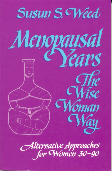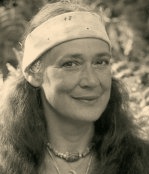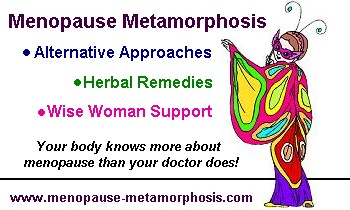excerpt from New
Menopausal Years the Wise Woman Way by Susun S. Weed
Herbal Allies for Post-Menopausal Women pp. 248-252
Bioflavonoids
Plants containing flavonoids (from the Latin, flavus, yellow)
were originally valued as dye plants. Today we appreciate
them because we know they are anti-inflammatory, antihepatotoxic,
anti-tumor, antimicrobial, antiviral, antioxidant, antiallergic,
antiulcer, analgesic, and strengthening to the entire circulatory
system, from capillaries to heart.
Flavonoids have an estrogenic effect, scientifically established
as 1/50,000th the activity of estradiol. Bioflavonoids in
foods are essential to our ability to absorb ascorbic acid.
No wonder plants exceptionally rich in flavonoids are such
important allies for post-menopausal women.
Regular use of bioflavonoid-rich herbs helps:
+ restore vaginal lubrication
+ decrease or end hot flashes
+ improve pelvic tone
+ improve liver activity
+ strengthen the bladder
+ lower risk of stroke & heart attack
+ reduce water build-up in tissues
+ reduce muscle cramping
+ ease sore joints
+ improve resistance to infection
 The richest source of bioflavonoids is the inner skin of citrus
fruits. “Peel Power” is a lovely way to start
the day.
The richest source of bioflavonoids is the inner skin of citrus
fruits. “Peel Power” is a lovely way to start
the day.
 Buckwheat greens, Buckweizen, Sarrasin (Fagopyrum esculentum)
are an exceptional source of bioflavonoids. Grow them at home,
like alfalfa sprouts, or buy them dried and made into tablets.
(Kasha, the grain of buckwheat, does not contain bioflavonoids.)
The wild equivalent is the leaves of yellow dock (Rumex crispus)
or any knotweed (Polygonum).
Buckwheat greens, Buckweizen, Sarrasin (Fagopyrum esculentum)
are an exceptional source of bioflavonoids. Grow them at home,
like alfalfa sprouts, or buy them dried and made into tablets.
(Kasha, the grain of buckwheat, does not contain bioflavonoids.)
The wild equivalent is the leaves of yellow dock (Rumex crispus)
or any knotweed (Polygonum).
 Elder, Holunder, Sureau (Sambucus nigra and other species)
is rich in bioflavonoids. I use the berries in jelly and wine,
and the flowers for tinctures and wines.
Elder, Holunder, Sureau (Sambucus nigra and other species)
is rich in bioflavonoids. I use the berries in jelly and wine,
and the flowers for tinctures and wines.
 Hawthorn, Weissdorn, Aubépine (Crataegus oxycantha
and other species) offers berries, flowers, and leaves full
of bioflavonoids. I use the berries to makes jellies, wines,
and a heart-strengthening tincture. The flowers and leaves,
dried, make a wonderful tea.
Hawthorn, Weissdorn, Aubépine (Crataegus oxycantha
and other species) offers berries, flowers, and leaves full
of bioflavonoids. I use the berries to makes jellies, wines,
and a heart-strengthening tincture. The flowers and leaves,
dried, make a wonderful tea.
 Horsetail, Ackerschachtelhalm, Prêle des champs (Equisetum
arvense) is best picked in the spring. I use it fresh in soups
(not salads) and dried as a tea.
Horsetail, Ackerschachtelhalm, Prêle des champs (Equisetum
arvense) is best picked in the spring. I use it fresh in soups
(not salads) and dried as a tea.
 Knotweeds, Vogelknöterich, Renouée des oiseaux,
Ho Shou Wu (Polygonaceae) are well known for their abundance
of bioflavonoids. In addition to buckwheat and yellow dock
leaves, try the greens of any other knotweed local to your
area.
Knotweeds, Vogelknöterich, Renouée des oiseaux,
Ho Shou Wu (Polygonaceae) are well known for their abundance
of bioflavonoids. In addition to buckwheat and yellow dock
leaves, try the greens of any other knotweed local to your
area.
 Roses, Hagrose, Rosier (Rosa canina and other species) are
sisters to hawthorn and similarly abundant in bioflavonoids.
I use fresh rose hips in jellies and wines and dry them for
winter teas and soups. We eat the blossoms in salads and use
glycerin to draw out the healing qualities of flowers and
leaf buds.
Roses, Hagrose, Rosier (Rosa canina and other species) are
sisters to hawthorn and similarly abundant in bioflavonoids.
I use fresh rose hips in jellies and wines and dry them for
winter teas and soups. We eat the blossoms in salads and use
glycerin to draw out the healing qualities of flowers and
leaf buds.
 Shepherd's purse, Hirtentäschel, Capselle (Capsella bursa-pastoris)
leaves are wonderful in salads. When it flowers, I use the
whole fresh plant to make vinegar and vodka tinctures, capturing
bioflavonoids for later use. (A dose is 25-50 drops three
times daily.)
Shepherd's purse, Hirtentäschel, Capselle (Capsella bursa-pastoris)
leaves are wonderful in salads. When it flowers, I use the
whole fresh plant to make vinegar and vodka tinctures, capturing
bioflavonoids for later use. (A dose is 25-50 drops three
times daily.)
 Sea buckthorn, Sanddorn, Argousier (Hippophae rhamnoides)
leaves are rich in many nutrients needed by post-menopausal
women: bioflavonoids, carotenes (vitamin A), vitamin C, vitamin
E, and the B vitamin complex, especially B6. If you live where
it grows, try the tender baby leaves in salads.
Sea buckthorn, Sanddorn, Argousier (Hippophae rhamnoides)
leaves are rich in many nutrients needed by post-menopausal
women: bioflavonoids, carotenes (vitamin A), vitamin C, vitamin
E, and the B vitamin complex, especially B6. If you live where
it grows, try the tender baby leaves in salads.
 Toadflax,
Frauenflachs, Linaire commune (Linaria vulgaris) flowers add
flavonoids to salads. They can also be tinctured. (A dose
is 15-20 drops.)
Toadflax,
Frauenflachs, Linaire commune (Linaria vulgaris) flowers add
flavonoids to salads. They can also be tinctured. (A dose
is 15-20 drops.)
 White dead nettle, Weisse Taubnessel, Lamier blanc (Lamium
album) doesn't sting, so try it in salads. Or dry bunches
when it's flowering and get your bioflavonoids from the infusion;
or make a vinegar.
White dead nettle, Weisse Taubnessel, Lamier blanc (Lamium
album) doesn't sting, so try it in salads. Or dry bunches
when it's flowering and get your bioflavonoids from the infusion;
or make a vinegar.

Vitamins
For the Menopausal Years
Lists are arranged thusly: Most important sources, in decreasing
order, are first.
Other excellent sources follow the semicolon.
Vitamin A: Vitamin A is formed in the liver
from ingested carotenes and carotenoids. No plants contain
it. Liver, milk, and eggs do. In pill form, vitamin A can
cause birth defects, hair loss, and liver stress.
 Depleted
by: Coffee, alcohol, cortisone, mineral oil, fluorescent lights,
liver “cleansing,” excessive intake of iron, lack
of protein.
Depleted
by: Coffee, alcohol, cortisone, mineral oil, fluorescent lights,
liver “cleansing,” excessive intake of iron, lack
of protein.
Vitamin B complex: For healthy digestion,
good liver function, emotional flexibility, less anxiety,
sound sleep, milder hot flashes with less sweating, steady
heart beat.
 Depleted
by: Coffee, alcohol, tobacco, refined sugar, raw oysters,
hormone replacement, birth control pills (deplete B6 especially).
Depleted
by: Coffee, alcohol, tobacco, refined sugar, raw oysters,
hormone replacement, birth control pills (deplete B6 especially).
Food
Sources of B vitamins: Whole grains, well-cooked greens,
organ meat (liver, kidneys, heart), sweet potatoes, carrots,
molasses, nuts, bananas, avocados, grapes, pears; egg yolks,
sardines, herring, salmon, crab, oysters, whey.
Herbal Sources of B vitamins: Red clover blossoms,
parsley leaf, oatstraw. See also specific factors, following.
Vitamin B1, Thiamine: For emotional ease,
strong nerves.
Food Sources of B1, Thiamine: Asparagus, cauliflower,
cabbage, kale, barley grass, seaweeds, citrus fruits.
Herbal Sources of B1, Thiamine: Peppermint, burdock,
sage, yellow dock, alfalfa, red clover, fenugreek seeds, raspberry
leaves, nettle, catnip, watercress, yarrow leaf/flower, rose
buds and hips.
Vitamin B2, Riboflavin: For more energy,
healthy skin, less cancer.
 Depleted
by: Hot flashes, crying jags, antibiotics, tranquilizers.
Depleted
by: Hot flashes, crying jags, antibiotics, tranquilizers.
Food Sources of B2, Riboflavin: Beans, greens, onions,
seaweeds, yogurt, cheese, milk, mushrooms.
Herbal Sources of B2, Riboflavin: Peppermint, alfalfa
greens, parsley, echinacea, yellow dock, hops; dandelion root,
ginseng, dulse, kelp, fenugreek seed, rose hips, nettles.
Vitamin B6, Pyridoxine: For improved immune
functioning; especially needed by women using hormone replacement.
Food Sources of B6: Baked potato with skin, broccoli,
prunes, bananas, dried beans, lentils; meat, poultry, fish.
Vitamin B factor, Folic acid: For strong,
flexible bones, easy nerves.
Food Sources of folic acid (folate): Leafy greens,
liver, kidney, lentils, whole grains, seeds, nuts, fruits,
vegetables.
Herbal Sources of Folic acid: Leaves: Nettles, alfalfa,
parsley, sage, catnip, peppermint, plantain, comfrey, chickweed.
Vitamin B factor, Niacin: For relief of
anxiety and depression, decrease in headaches, reduction of
blood cholesterol levels.
Food Sources of Niacin: Asparagus, cabbage, bee pollen.
Herbal Sources of Niacin: Hops, raspberry leaf, red
clover; slippery elm, echinacea, licorice, rose hips, nettle,
alfalfa, parsley.
Vitamin B12: For healthy metabolism, stronger
eyes, better memory, more energy, less cancer, osteoporosis,
arthritis, fibromylagia, and depression. Aids adsorption of
all other minerals, especially calcium.
 Depleted
by: Unfermented soy, lack of animal foods in the diet.
Depleted
by: Unfermented soy, lack of animal foods in the diet.
Food Sources of B12: Liver, kidney, yogurt, cheese,
milk, eggs, meat, poultry, shellfish.
Herbal Sources of B12: None.
Bioflavonoids: For healthy heart and blood
vessels, fewer hot flashes and night sweats, less menstrual
bleeding, unlumpy breasts, less water retention, less anxiety,
less irritable nerves.
Food Sources of Bioflavonoids: Citrus pulp and rind.
Herbal Sources of Bioflavonoids: Buckwheat greens,
elder berries, hawthorn fruits, rose hips, horsetail, shepherd’s
purse, chervil.
Carotenes: For a well-lubricated vagina,
strong bones, protection against cancer, healthy lungs and
skin, strong vision, good digestion.
Food Sources of Carotenes: Well-cooked red, yellow,
or green vegetables/fruits: carrots, winter squash, tomatoes,
seaweeds, cantaloupe.
Herbal Sources of Carotenes: Peppermint, yellow dock,
uva ursi, parsley, alfalfa, raspberry, nettles, dandelion
greens; kelp, green onions, violet leaves, cayenne, paprika,
lamb’s quarters leaves, sage, chickweed, horsetail,
black cohosh roots, rose hips.
Vitamin C complex: For less intense hot
flashes, less insomnia and night sweats, stronger bones, fewer
headaches, better resistance to infection, smoother emotions,
less heart disease, rapid wound healing. Critical to good
adrenal functioning, especially during menopause.
 Depleted
by: Antibiotics, aspirin and other pain relievers, coffee,
stress, aging, smoking, baking soda, high fever.
Depleted
by: Antibiotics, aspirin and other pain relievers, coffee,
stress, aging, smoking, baking soda, high fever.
Food Sources of Vitamin C: Freshly picked foods,
cooked potatoes.
Herbal Sources of Vitamin C: Rose hips, yellow dock
root, raspberry leaf, red clover, hops; pine needles, dandelion
greens, alfalfa greens, echinacea, skullcap, plantain, parsley,
cayenne, paprika.
Vitamin D: For very strong, very flexible
bones, hormonal ease,
cancer prevention, regulation of glucose metabolism, reduction
of risk of adult onset diabetes.
 Depleted
by: Mineral oil used on the skin, frequent hot baths, sunscreen
with SPF8 or higher.
Depleted
by: Mineral oil used on the skin, frequent hot baths, sunscreen
with SPF8 or higher.
Food Sources of Vitamin D: Sunlight, butter, egg
yolk, cod liver oil; liver, shrimp, fatty fish (mackerel,
sardines, herring, salmon, tuna).
Herbal Sources of Vitamin D: None. Vitamin D is not
found in plants.
Vitamin E: for milder hot flashes, fewer
night sweats, protection from cancer, fewer signs of aging,
fewer wrinkles, moist vagina, strong heart, freedom from arthritis.
 Depleted
by: Mineral oil, sulfates, hormone replacement.
Depleted
by: Mineral oil, sulfates, hormone replacement.
Food Sources of Vitamin E: Freshly ground whole-grain flours,
cold-pressed oils; fresh nuts, peanut butter, leafy greens,
cabbage, asparagus.
Herbal Sources of Vitamin E: Alfalfa, rosehips, nettles,
dong quai, watercress, dandelion, seaweeds, wild seeds (lamb’s
quarters, plantain).
Essential fatty acids (EFAs), including GLA, omega-6
and omega-3. For a healthy heart, less severe hot
flashes, strong nerves, strong bones, well-functioning endocrine
glands, fewer wrinkles.
Food Sources of EFAs: Flax seeds, cod liver oil,
wheat germ oil, whole grains; seeds such as borage, evening
primrose, black currant, hemp, safflower, and their oils.
Herbal Sources of EFAs: All wild plants, but very
few cultivated plants, contain EFAs; fresh purslane is notably
high.
Folic Acid: See vitamin B factor, folic
acid.
Vitamin K: For less menstrual flooding,
stronger bones.
 Depleted
by: X-rays, radiation, air pollution, enemas, frozen foods,
antibiotics, rancid fats, aspirin.
Depleted
by: X-rays, radiation, air pollution, enemas, frozen foods,
antibiotics, rancid fats, aspirin.
Food Sources of Vitamin K: Healthy intestinal bacteria
produce vitamin K; green leafy vegetables, yogurt, egg yolk,
blackstrap molasses.
Herbal Sources of Vitamin K: Nettle, alfalfa, kelp,
green tea.

Minerals
Boron: For strong, flexible bones.
Food Sources of Boron: Organic fruits, vegetables,
nuts.
Herbal Sources of Boron: All organic garden weeds
including all edible parts of chickweed, purslane, nettles,
dandelion, yellow dock.
Calcium: For sound sleep, dense bones, calm
heart, strong muscles, less irritable nerves, lower blood
pressure, sound blood vessels, regular heart beat, freedom
from depression and headaches, less bloating, fewer mood fluctuations.
 Depleted
by: Coffee, sugar, salt, alcohol, cortisone, enemas, unfermented
soy products, antacids, too much phosphorus.
Depleted
by: Coffee, sugar, salt, alcohol, cortisone, enemas, unfermented
soy products, antacids, too much phosphorus.
Food Sources of Calcium: Yogurt, raw-milk cheese,
dark green leaves; nuts, seeds, tahini, seaweeds, vegetables
(especially sweet potatoes, cabbage), dried beans, whole grains,
whey, salmon, tuna, sardines, shellfish.
Herbal Sources of Calcium: Valerian, kelp, nettle,
horsetail, peppermint; sage, uva ursi, yellow dock, chickweed,
red clover, oatstraw, parsley, black currant leaf, raspberry
leaf, plantain leaf/seed, dandelion leaf, amaranth leaf/seed,
lamb’s quarter leaf/seed.
Chromium: For less fatigue and lots of energy,
fewer mood swings, stable blood sugar levels, higher HDL;
less risk of adult onset diabetes.
 Depleted
by: White sugar.
Depleted
by: White sugar.
Food Sources of Chromium: Barley grass, prunes, nuts,
mushrooms, liver, beets, whole wheat, bee pollen.
Herbal Sources of Chromium: Oatstraw, nettle, red
clover tops, catnip, dulse, wild yam, yarrow, horsetail; roots
of black cohosh, licorice, echinacea, valerian, sarsaparilla.
Copper: For supple skin, healthy hair, strong
muscles, easy nerves, less water retention, less menstrual
flooding, lower blood cholesterol.
Food Sources of Copper: Liver, kidney, seafood, organically
grown grains, beans, nuts, leafy greens, seaweeds, bittersweet
chocolate, mushrooms.
Herbal Sources of Copper: Skullcap, sage, horsetail;
chickweed.
Iodine: For fewer breast lumps, less fatigue,
healthier thyroid function, stronger liver.
 Depleted
by: Unfermented soy products.
Depleted
by: Unfermented soy products.
Food Sources of Iodine: Seafood, seaweed, sea salt,
spinach, beets, mushrooms.
Herbal Sources of Iodine: Kelp, parsley, celery,
sarsaparilla root.
Iron: For fewer hot flashes, less menstrual
flooding, fewer headaches, better sleep with fewer night sweats,
easier nerves, more energy, less dizziness.
 Depleted
by: Coffee, black tea, alcohol, aspirin, carbonated drinks,
lack of protein, enemas, unfermented soy, processed dairy.
Depleted
by: Coffee, black tea, alcohol, aspirin, carbonated drinks,
lack of protein, enemas, unfermented soy, processed dairy.
Food Sources of Iron: Liver, red meat, canned salmon,
sardines, egg yolk, leafy greens, molasses, dried fruit (cherries,
raisins, prunes, dates, figs), yellow/orange/red vegetables,
bittersweet chocolate; whole wheat, oatmeal, brown rice, mushrooms,
potatoes, honey, seaweeds.
Herbal Sources of Iron: Chickweed, kelp, burdock
root, catnip, horsetail, Althea root, milk thistle seed, uva
ursi, dandelion leaf/root; yellow dock, dong quai, black cohosh,
echinacea, licorice, valerian, and sarsaparilla roots, nettles,
plantain leaf, fenugreek seed, peppermint.
Magnesium: For deeper sleep, less anxiety,
easier nerves, flexible bones and arteries, lower cholesterol,
lower blood pressure, stronger heart, more energy, less fatigue,
fewer headaches/migraines.
 Depleted
by: Hot flashes, night sweats, crying jags, alcohol, chemical
diuretics, enemas, antibiotics, “soft” water,
excessive fat intake.
Depleted
by: Hot flashes, night sweats, crying jags, alcohol, chemical
diuretics, enemas, antibiotics, “soft” water,
excessive fat intake.
Food sources of Magnesium: Leafy greens, seaweeds,
nuts, whole grains, yogurt, cheese; potatoes, corn, peas,
squash, beans, figs.
Herbal Sources of Magnesium: Oatstraw, licorice,
kelp, nettle, dulse, burdock root, chickweed, Althea root,
horsetail; sage, raspberry leaf, red clover, valerian, yellow
dock, dandelion greens, carrot tops, parsley leaf, evening
primrose.
Manganese: for keen hearing, flexible bones,
reduction of dizziness, prevention of diabetes.
 Depleted
by: Chemical fertilizers used agriculturally.
Depleted
by: Chemical fertilizers used agriculturally.
Food Sources of Manganese: Any leaves or seeds from
plants grown on healthy soil; seaweeds.
Herbal Sources of Manganese: Raspberry, uva ursi
leaf, chickweed, milk thistle seed, yellow dock; ginseng,
wild yam, echinacea, and dandelion roots, nettle, catnip,
kelp, horsetail, hops flowers.
Molybdenum: for fewer hot flashes, prevention
of anemia.
Food Sources of Molybdenum: Organically raised dairy
products, legumes, grains, leafy greens, seaweeds.
Herbal Sources of Molybdenum: Nettles, dandelion
greens, sage, oatstraw, fenugreek seeds, raspberry leaves,
red clover blossoms, horsetail, chickweed, kelp.
Nickel: For milder hot flashes, easy nerves.
Food Sources of Nickel: Chocolate, nuts, dried beans,
cereals.
Herbal Sources of Nickel: Alfalfa, red clover, oatstraw,
fenugreek.
Phosphorus: For strong, flexible bones,
more energy.
 Depleted
by: Antacids.
Depleted
by: Antacids.
Food Sources of Phosphorus: Whole grains, seeds,
nuts.
Herbal Sources of Phosphorus: Peppermint, yellow
dock, milk thistle, fennel, hops, chickweed; nettle, dandelion,
parsley, dulse, red clover.
Potassium: For more energy, less fatigue,
less water retention, easy weight loss, steady heart beat,
lower blood pressure, better digestion.
 Depleted
by: Frequent hot flashes, sweating, night sweats, coffee,
sugar, salt, alcohol, enemas, vomiting, diarrhea, chemical
diuretics, dieting.
Depleted
by: Frequent hot flashes, sweating, night sweats, coffee,
sugar, salt, alcohol, enemas, vomiting, diarrhea, chemical
diuretics, dieting.
Food Sources of Potassium: Celery, cabbage, peas,
parsley, broccoli, bananas, carrots, potato skin, whole grains,
pears, citrus, seaweed.
Herbal Sources of Potassium: Sage, catnip, peppermint,
skullcap, hops, dulse, kelp, red clover; horsetail, nettles,
plantain leaf.
Selenium: For clear vision, slower aging,
strong immunity, less irrita-bility, more energy, healthy
hair/nails/teeth, less cardiovascular disease.
Food sources of Selenium: Liver, raw milk cheeses,
seaweeds, whole grains, garlic, kidneys, fish, shellfish,
meat, yogurt, beans.
Herbal Sources of Selenium: Catnip, milk thistle
seed, valerian root, dulse, black cohosh and ginseng roots;
uva ursi leaf, hops flowers, kelp, raspberry leaf, rose buds
and hips, hawthorn berries, fenugreek seed, roots of echinacea,
sarsaparilla, and yellow dock.
Silicon: For strong, flexible bones, less
irritable nerves.
Food Sources of Silicon: Unrefined grains, root vegetables,
spinach, leeks.
Herbal Sources of Silicon/Silica: Horsetail, dulse,
echinacea, cornsilk, burdock, oatstraw, licorice, chickweed;
uva ursi, sarsaparilla.
Sulfur: For relaxed muscles, soft skin,
healthy nerves, strong liver, glossy hair.
Food Sources of Sulfur: Eggs, dairy products, cabbage
family plants, onions, garlic, parsley, watercress.
Herbal Sources of Sulfur: Sage, nettles, plantain,
horsetail.
Zinc: For slower aging, better digestion,
stronger bones, healthy skin, cancer prevention, increased
sex drive.
 Depleted
by: Alcohol, air pollution, hormone replacement.
Depleted
by: Alcohol, air pollution, hormone replacement.
Food Sources of Zinc: Liver, meat, sardines, oysters,
eggs, yogurt, leafy greens, beans, pumpkin seeds, nuts, whole
grains.
Herbal Sources of Zinc: Skullcap, sage, wild yam,
chickweed, echinacea, nettles, dulse, milk thistle; sarsaparilla.
 Menopause
Metamorphosis Duo
Menopause
Metamorphosis Duo
You get Susun Weed's book,
NEW Menopausal Years the Wise Woman Way, and her
video,
Menopause Metamorphosis. Ordering this duo is
like getting a support group in your home to help you Change.
Half a million women worldwide consider this book their menopause
bible. The video includes ceremonies, songs, specific instructions
and demonstrations on using herbs, and heart felt advice from
women who've been there. You too can have a healthy heart,
strong bones, and tremendous energy without hormones.
.
Click
here to read another excerpt from NEW
Menopausal Years the Wise Woman Way by Susun S.
Weed and learn more about herbal allies for the menopausal
years.
Want
to read more? click here.

Menopause from Three Directions - 2 CD set
 Susun Weed at Green Nations Gathering 1996 - Science says menopause is ovarian failure, leading to diseases caused by lack of estrogen. The Heroic or Alternative Medicine view is that menopausal symptoms are caused by underlying imbalances. The Wise Woman prespective reveals menopause as a natural and healthy change. Time: CD1/49:54 min. & CD2/42:45 min.
Susun Weed at Green Nations Gathering 1996 - Science says menopause is ovarian failure, leading to diseases caused by lack of estrogen. The Heroic or Alternative Medicine view is that menopausal symptoms are caused by underlying imbalances. The Wise Woman prespective reveals menopause as a natural and healthy change. Time: CD1/49:54 min. & CD2/42:45 min.
Order Menopause from Three Directions CD set in our Bookshop
Wise Woman Center -- Workshops
for Women
Join us this year for spirit healing and herbal
medicine workshops, intensives,
and apprenticeships
with Susun Weed and other Wise
Woman teachers. The Wise Woman Center in Woodstock NY
exists to re-weave the healing cloak of the Ancients. This
land, this sacred sanctuary for women is a place for the teachings
of the Wise Woman way. The Goddess lives here, as do goats,
fairies, green witches, and elders. Located between Woodstock
and Saugerties, 5 miles from the NYS Thruway, the Wise Woman
Center is easily accessible while private enough for nude
swimming. You'll receive a map and directions when you register.
Nourishing wild-food vegetarian meals are included with all
workshops.
See the Calendar
of Events & Workshop schedule (and to register) for this
year, click here.

 Menopause
Metamorphosis Duo
Menopause
Metamorphosis Duo Susun Weed at Green Nations Gathering 1996 - Science says menopause is ovarian failure, leading to diseases caused by lack of estrogen. The Heroic or Alternative Medicine view is that menopausal symptoms are caused by underlying imbalances. The Wise Woman prespective reveals menopause as a natural and healthy change. Time: CD1/49:54 min. & CD2/42:45 min.
Susun Weed at Green Nations Gathering 1996 - Science says menopause is ovarian failure, leading to diseases caused by lack of estrogen. The Heroic or Alternative Medicine view is that menopausal symptoms are caused by underlying imbalances. The Wise Woman prespective reveals menopause as a natural and healthy change. Time: CD1/49:54 min. & CD2/42:45 min.
